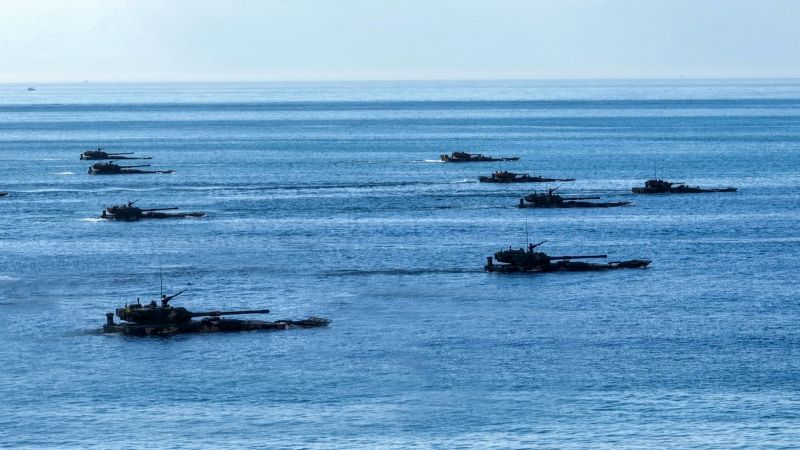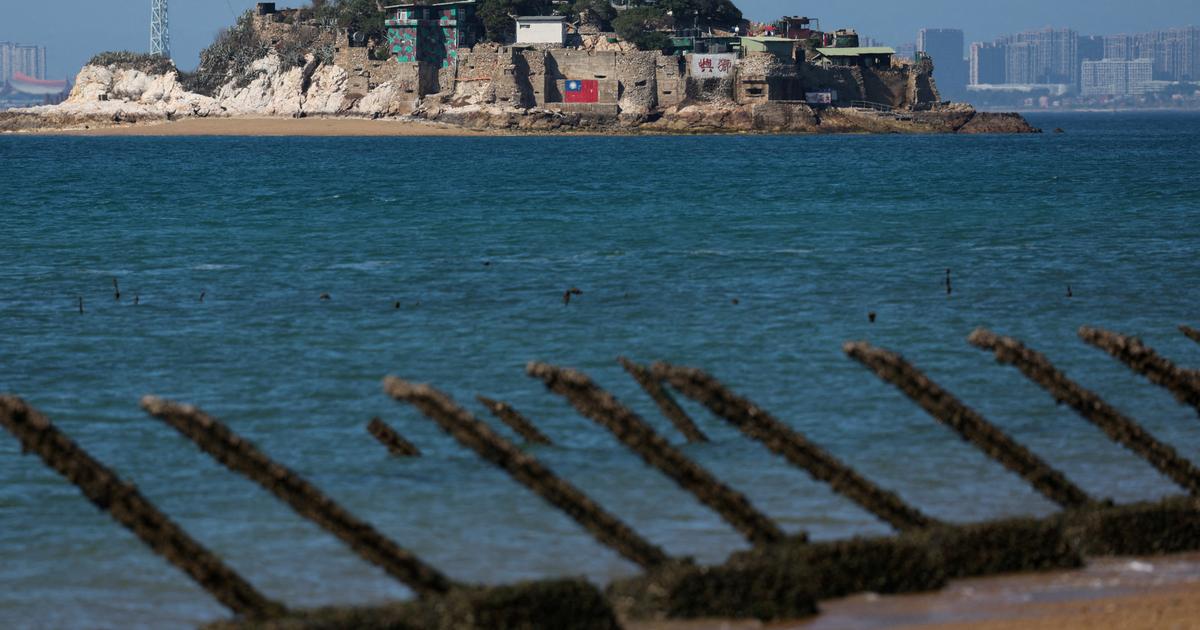Shares of TSMC, the world's largest chipmaker, rise 1:02
(CNN) --
A Chinese invasion of Taiwan in 2026 would cause thousands of casualties among Chinese, American, Taiwanese and Japanese forces, and would be unlikely to result in a victory for Beijing, according to a leading independent think tank. of Washington, which conducted simulations of war games of a possible conflict that worries the military and political leaders of Asia and Washington.
A war over Taiwan could leave the US military – victorious in this simulation – in as sorry a state as the Chinese forces it would defeat.
What about between China and Taiwan?
Are they part of the same country?
How is your story and relationship?
By the end of the conflict, at least two US aircraft carriers would lie at the bottom of the Pacific and China's modern navy, the world's largest, would be "wrecked."
These are some of the conclusions reached by the Center for Strategic and International Studies (CSIS), after conducting what it claims is one of the most extensive war game simulations ever conducted of a potential conflict. for Taiwan, the democratically governed island of 24 million that the Chinese Communist Party claims as part of its sovereign territory despite never having controlled it.
Elon Musk gives ideas to end tensions between China and Taiwan 0:43
Chinese leader Xi Jinping has refused to rule out the use of military force to bring the island under Beijing's control.
advertising
CNN reviewed an advance copy of the report – titled "The First Battle of the Next War" – on the two dozen war scenarios run by CSIS, which said the project was necessary because previous government and private war simulations have been too limited. or too opaque to give the public and policy makers a real picture of how the conflict across the Taiwan Strait might play out.
"There is no declassified war game that looks at the conflict between the United States and China," said Mark Cancian, one of the three directors of the project and a senior adviser at the Center for Strategic and International Studies.
"Of the games that aren't ranked, they're usually only done once or twice."
CSIS conducted this war game 24 times to answer two fundamental questions: would the invasion succeed and at what cost?
The likely answers to those two questions are no and huge, according to the CSIS report.
"The United States and Japan would lose dozens of ships, hundreds of aircraft, and thousands of military personnel. Such losses would damage the global standing of the United States for many years to come," the report said.
In most scenarios, the US Navy would lose two aircraft carriers and between 10 and 20 large surface combatants.
Approximately 3,200 US soldiers would die in three weeks of combat, almost half of what the United States lost in two decades of combat in Iraq and Afghanistan.
Negotiations between the US and Taiwan begin 1:12
"China is also suffering greatly. Its navy is in shambles, its core amphibious forces are in shambles, and tens of thousands of soldiers are prisoners of war."
The report estimated that China would suffer the deaths of some 10,000 soldiers and lose 155 combat aircraft and 138 major ships.
Taiwan would be devastated
The scenarios paint a bleak future for Taiwan, even if a Chinese invasion is unsuccessful.
"Although Taiwan's military is intact, it is severely degraded and left to defend a damaged economy on an island without electricity or basic services," the report said.
The island's Army would suffer some 3,500 casualties, and all 26 destroyers and frigates of its Navy would be sunk, according to the report.
Japan is likely to lose more than 100 fighter jets and 26 warships as US military bases on its soil are attacked by China, according to the report.
But CSIS said it did not want its report to imply that a war over Taiwan "is inevitable or even likely."
"The Chinese leadership could adopt a strategy of diplomatic isolation, pressure in the gray zone or economic coercion against Taiwan," he said.
Dan Grazier, a Defense Policy expert at Project on Government Oversight (POGO), sees an all-out invasion of Taiwan by China as highly unlikely.
Such a military operation would immediately disrupt the imports and exports that the Chinese economy depends on for its survival, Grazier told CNN, and disruption of this trade could cause the Chinese economy to collapse within a short time.
China relies on imports of food and fuel to power its economic engine, Grazier said, and they have little room for manoeuvre.
Here's what Taiwan's foreign minister is most concerned about China 1:14
"In my opinion, the Chinese are going to do everything they can to avoid a military conflict with anyone," Grazier said.
To challenge the United States for world dominance, they will use industrial and economic power instead of military force.
But Pentagon leaders have called China a "latent threat" to the United States, and last year's report on China's military power, commissioned by Congress, said that "the People's Liberation Army (PLA) has increased provocative and destabilizing actions in and around the Taiwan Strait, including increased flights in Taiwan's claimed air defense identification zone and the conduct of exercises focused on the possible seizure of one of Taiwan's outlying islands."
In August, the visit to the island of the then Speaker of the US House of Representatives, Nancy Pelosi, generated a wide deployment of the military might of the Taiwan People's Liberation Army, which included the launch of missiles on the island. , as well as the waters of the exclusive economic zone of Japan.
China increases military pressure
Since then, Beijing has intensified its aggressive military pressure tactics on the island, sending fighter jets across the Taiwan Strait, the body of water that separates Taiwan from China, and into the island's air defense identification zone. , a strip of airspace commonly referred to as ADIZ.
And speaking of Taiwan at the 20th Congress of the Chinese Communist Party in October, Chinese leader Xi Jinping drew loud applause when he said China would "strive for peaceful reunification" but then issued a grim warning: "never We will promise to renounce the use of force and reserve the option to take all necessary measures."
The Biden administration has remained steadfast in its support for the island, as established in the Taiwan Relations Act, under which Washington will provide the island with the means to defend itself without committing US troops to that defense.
The presidents of China and Russia agree to strengthen bilateral ties 2:20
The recently signed National Defense Authorization Act commits the US to a modernization program for the Taiwanese military and provides for $10 billion in security aid over five years, a strong sign of long-term bipartisan support. term to the island.
Biden, however, has said more than once that US military personnel would defend Taiwan if the Chinese military launched an invasion, even as the Pentagon has insisted there is no change to Washington's "One China" policy. .
Under the "One China" policy, the US acknowledges China's position that Taiwan is part of China, but has never officially recognized Beijing's claim to the autonomous island.
"Wars occur even when objective analysis might indicate that the attacker might not be successful," Cancian said.
According to the CSIS report, in order for US troops to prevent China from finally taking control of Taiwan, there are four constants that emerge from the 24 iterations of the war game it played:
Taiwan's ground forces must be able to contain the Chinese beachheads;
The US must be able to use its bases in Japan for combat operations;
The US must have long-range anti-ship missiles to hit the Chinese Navy from afar and "en masse";
and the US needs to fully arm Taiwan before the shooting starts and immediately jump into any conflict with its own forces.
There is no "Ukrainian model" for Taiwan
"There is no 'Ukrainian model' for Taiwan," the report states, referring to how US and Western aid slowly trickled into Ukraine long after Russia's invasion of its neighboring country began and no US or U.S. troops NATO is actively fighting Russia.
The Chinese economy grew more than 4%, according to Xi Jinping 0:54
"Once the war starts, it's impossible to get troops or supplies to Taiwan, so it's a very different situation than Ukraine, where the United States and its allies have been able to continuously send supplies to Ukraine," Cancian said.
"Whatever the Taiwanese are going to fight in the war with, they have to have that when the war starts."
Washington will have to start acting soon if it is to follow through on some of the CSIS recommendations to succeed in a potential conflict in Taiwan, the
think tank said.
Among them, fortifying US bases in Japan and Guam against Chinese missile attacks;
move their naval forces to smaller, more survivable ships;
give priority to submarines;
prioritize sustainable bomber forces over fighter ones;
but at the same time producing more cheaper fighters;
and push Taiwan toward a similar strategy, arming itself with simpler weapons platforms instead of expensive ships that would likely not survive a Chinese first strike.
According to the CSIS report, these policies would make victory less costly to the US military, but the cost would still be high.
"The US could win a Pyrrhic victory, suffering more in the long run than the 'defeated' Chinese."
"Victory is not everything," the report said.
china united states news taiwan




